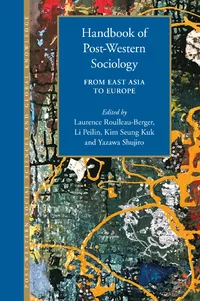 We entered a new era in the 21st century.
We entered a new era in the 21st century.
The events and upheavals of the past 30 years , such as globalization, planetization, and the emergence of a global knowledge and information society, have created new sources of wealth and power.
As we no longer have anything external to the global system, we have no choice but to think globally and solve the global problems facing humanity. This change in attitude has diminished the effectiveness of Western social theory and loosened its traditional framework, including the center, semi-periphery, and periphery.
In other words, all events must be evaluated from a global perspective. In response to these changes, reexaminations of philosophy, history, postcolonialism, the civilization theory, the evolution of the multiple modernity theory, and hegemonic sociology have progressed.
To deepen these reexaminations, equal and sincere exchanges of Western knowledge (US, Europe, etc..) and reality and those of non-Western Europe are essential.
In keeping with this trend, Post-Western sociology has emerged as a successor to Western sociology, which has been criticized since the late 1960s. Post-Western sociology attempted to overcome epistemic injustice. To this end, we must reexamine basic concepts, such as consciousness, time, space, body, language, technology, and ideology, including the foundations and hypotheses that are unconsciously assumed.
This reexamination is not an issue of a dichotomy between subject and structure; rather, the body mediates the structure and subject and places more emphasis on the internal approach (i.e., focusing on the internal aspects of the subject).
Post-Western sociology was developed in collaboration with Li Peilin and advocated by Laurence Roulleau-Berger, an expert on Chinese society and sociology and the history of Chinese sociology. A well-known example is Roulleau-Berger’s book, Post-Western Revolution in Sociology (Brill, 2016). However, the core of this argument is fairly flexible and open to the participation and contributions of many people.
The following presents Post-Western sociology in a simplified manner: Cosmopolitanism in Hard Times (Brill, 2021), edited by Vincenzo Cicchelli and Sylvie Mesure. (I wrote the postscript to the book.) This volume contains a chapter that summarizes an analysis of various social and cultural behaviors and youth movements around the world. In this chapter , Roulleau-Berger stated that Post-Western sociology is typically embodied in digital cosmopolitanism. Therefore, the direction of enriching Beck’s theory through case analyses falls within the scope of Post-Western sociology (see Sang-Jin Han’s presentation at the ISA World Congress of Sociology, Melbourne 2023).
This spring, four editors (Laurence Roulleau-Berger, Li Peilin, Kim Sam Kuk, and Yazawa Shujiro) compiled contributions from researchers from France, China, and South Korea and published the Handbook of Post-Western Sociology: From East Asia to Europe (Brill, 2023), representing a milestone in the movement . This theme was actively discussed at the 3rd Congress of East Asian Sociological Association held at Jilin University in China in August 2023.
In December 2023, an international conference on Post-Western sociology from East Asia to Europe will be held in Lyon, France. A similar conference is scheduled to be organized in South Korea in 2024.
Since World War II, we have focused on building a society that emphasizes humanity, starting from positively evaluated concepts, such as the liberal society by Karl Popper, the new society by Edward Carr, and the open society by Henri Bergson. We have not succeeded in fulfilling the task of building a “humankind society” for various possible reasons, but the reality is that the evaluation and acceptance of the humanities and social sciences are underdeveloped compared to those of science and technology. They are generally not accepted by society. Therefore, we must prove that living is a sociological process.
One of the challenges in the construction of Post-Western sociology in Japan is examining whether the traditional ideas of Japan, such as those investigated by Motoori Norinaga, were inherited or discarded in modern sociology.
Additionally,what is the relationship between Motoori Norinaga’s views of Japan, Yanagita Kunio’s folklore studies, and even Karl Lowith’s works?
Ultimately, we must clarify the relationship between Japanese modernization and Western subjects and examine a two-story theory that does not have a bridge between Japanese and Western thoughts. Since the development of Post-Western sociology has been conducted using various approaches, I hope that this topic will gain scholarly attention.